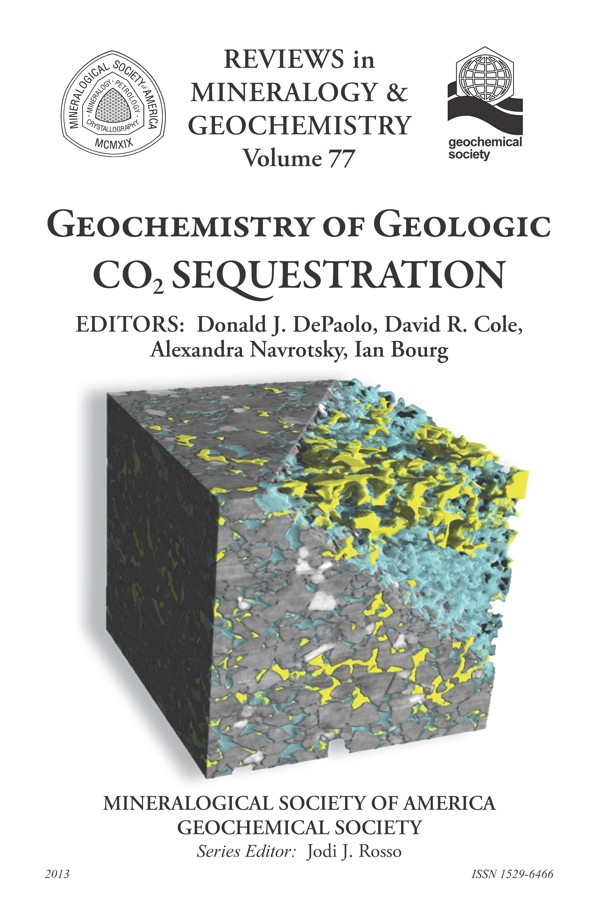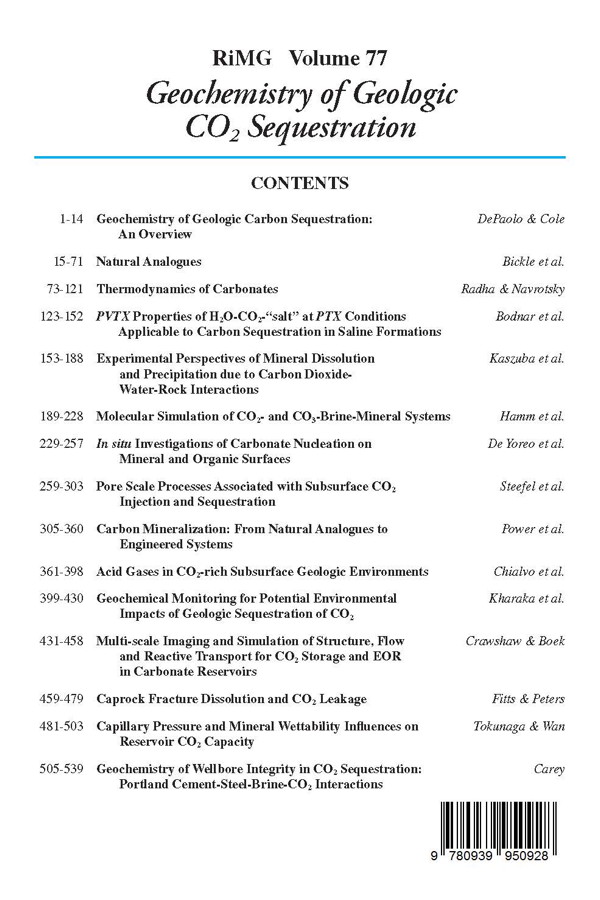

Mineralogical Society of America, Founded December 30, 1919
Order Publications Online (25% discount for MSA, CMS and GS members, except shipping)
MinPubs.org Pay-Per-View GeoScienceWorld Pay-Per-View


i-xiv + 539 pages. ISBN 978-0-939950-92-8, DOI: 10.2138/rmg.2012.77.0
Global climate change with substantial global warming may be the most important environmental challenge facing the world. Geologic carbon sequestration (GCS), in concert with energy conservation, increased efficiency in electric power generation and utilization, increased use of lower carbon intensity fuels, and increased use of nuclear energy and renewable sources, is now considered necessary to stabilize atmospheric levels of greenhouse gases and global temperatures at values that would not severely impact economic growth and the quality of life on Earth. Geological formations, such as depleted oil and gas fields, unmineable coal beds, and brine aquifers, are likely to provide the first large-scale opportunity for concentrated sequestration of CO2.
The specific scientific issues that underlie subsurface sequestration technology involve the effects of fluid flow combined with chemical, thermal, mechanical and biological interactions between fluids and surrounding geologic formations. Complex and coupled interactions occur both rapidly as the stored material is emplaced underground, and gradually over hundreds to thousands of years. The long sequestration times needed for effective storage, the large scale of GCS globally necessary to significantly impact atmospheric CO2 levels, and the intrinsic spatial variability of subsurface formations provide challenges to both scientists and engineers. A fundamental understanding of mineralogical and geochemical processes is integral to the success of GCS. Large scale injection experiments will be carried out and monitored in the next decade provides a unique opportunity to test our knowledge of fundamental hydrogeology, geochemistry and geomechanics.
This MSA volume focuses on important aspects of the geochemistry of geological CO2 sequestration. It is in large part an outgrowth of research conducted by members of the U.S. Department of Energy funded Energy Frontier Research Center (EFRC) known as the Center for Nanoscale Control of Geologic CO2 (NCGC). Eight out of the 15 chapters have been led by team members from the NCGC representing six of the eight partner institutions making up this center - Lawrence Berkeley National Laboratory (lead institution, D. DePaolo - PI), Oak Ridge National Laboratory, The Ohio State University, the University of California Davis, Pacific Northwest National Laboratory, and Washington University, St. Louis.
Donald J. DePaolo , Lawrence Berkeley National Laboratory
David R. Cole, The Ohio State University
Alexandra Navrotsky, University of California-Davis
Ian C. Bourg, Lawrence Berkeley National Laboratory
October 2013
Title Page
p. i
Copyright
p. ii
From the Series Editor & Preface
p. iii - iv
Table of Contents
p. v - xiv
Chapter 1. Geochemistry of Geologic Carbon Sequestration: An Overview
by Donald J. DePaolo and David R. Cole p. 1 - 14
Chapter 2. Natural Analogues
by Mike Bickle, Niko Kampman, and Max Wigley, p. 15 - 71
Chapter 3. Thermodynamics of Carbonates
by A. Venkataramana Radha and Alexandra Navrotsky, p. 73 - 121
Chapter 4. PVTX Properties of H20-C02-"salt" at PTX Conditions Applicable to Carbon Sequestration in Saline Formations
by Robert J. Bodnar, Matthew Steele-MacInnis, Ryan M. Capobianco, J. Donald Rimstidt, Robert Dilmore, Angela Goodman, and George Guthrie , p. 123 - 152
Chapter 5. Experimental Perspectives of Mineral Dissolution and Precipitation due to Carbon Dioxide-Water-Rock Interactions
by John Kaszuba, Bruce Yardley, and Muriel Andreani, p. 153 - 188
Chapter 6. Molecular Simulation of CO2- and C03-Brine-Mineral Systems
by Laura M. Hamm, Ian C. Bourg Adam F. Wallace, and Benjamin Rotenberg, p. 189 - 228
Chapter 7. In situ Investigations of Carbonate Nucleation on Mineral and Organic Surfaces
by by James J. De Yoreo, Glenn A. Waychunas, Young-Shin Iun, and Alejandro Fernandez-Martinez, p. 229 - 257
Chapter 8. Pore Scale Processes Associated with Subsurface CO2 Injection and Sequestration
by Carl I. Steefel, Sergi Molins, and David Trebotich, p. 259 - 304
Chapter 9. Carbon Mineralization: From Natural Analogues to Engineered Systems
by Ian M. Power, Anna L. Harrison, Gregory M. Dipple, Siobhan A. Wilson, Peter B. Kelemen, Michael Hitch, and Gordon Southam, p. 305 - 360
Chapter 10. Acid Gases in CO2-rich Subsurface Geologic Environments
by Ariel A. Chialvo, Lukas Vlcek, and David R. Cole, p. 361 - 398
Chapter 11. Geochemical Monitoring for Potential Environmental Impacts of Geologic Sequestration of CO2
by Yousif K. Kharaka, David R. Cole, James J. Thordsen, Kathleen D. Gans, and R. Burt Thomas, p. 399 - 430
Chapter 12. Multi-scale Imaging and Simulation of Structure, Flow and Reactive Transport for CO2 Storage and EOR in Carbonate Reservoirs
by by John P. Crawshaw and Edo S. Boek, p. 431 - 458
Chapter 13. Caprock Fracture Dissolution and CO2 Leakage
by Jeffery P. Fitts and Catherine A. Peters, p. 459 - 480
Chapter 14. Capillary Pressure and Mineral Wettability Influences on Reservoir CO2 Capacity
by Tetsu K. Tokunaga and Iiamin Wan, p. 481 - 503
Chapter 15. Geochemistry of Wellbore Integrity in CO2 Sequestration:
Portland Cement-Steel-Brine-CO2 Interactions
by J. William Carey, p. 505 - 539